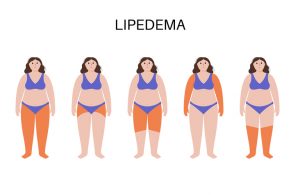 Nearly 11% of adult women worldwide suffer from lipedema, a chronic condition that causes an abnormal buildup of fat in the lower body.
Nearly 11% of adult women worldwide suffer from lipedema, a chronic condition that causes an abnormal buildup of fat in the lower body.
Lipedema occurs almost exclusively in people assigned female at birth and typically begins or worsens during periods of significant hormonal change in the body such as puberty, pregnancy, or menopause. No specific cause other than genetics has been identified for lipedema.
Although more than half of all patients with this condition are obese, the fat buildup that occurs in patients with lipedema is not necessarily linked directly with the same factors that cause obesity, since calorie restrictions in these patients can cause them to lose weight in their upper body without losing fat in the lower body.
The link between lipedema and obesity also extends to comorbidities that commonly occur alongside this condition. Many people who suffer from this disease may also experience hypothyroidism, venous insufficiency, arthritis, and other chronic conditions for which obesity is a known risk factor.
Aside from fat accumulation, lipedema also causes tenderness and swelling in the affected areas. People with this condition may bruise more easily in these areas and feel a consistent level of pain. Additionally, the accumulated fat can block the body’s lymphatic pathway, causing another condition called lymphedema that involves a buildup of lymph fluid.
Several treatments are available for people with lipedema. Manual lymphatic drainage therapy, which is performed through gentle stretching and massaging of the skin, can help remove waste and break up fibrosis in limbs affected by this condition. Complex decongestive therapy, another noninvasive treatment that prevents lymph fluid buildup, also reduces inflammation and swelling in affected areas.
In severe cases, invasive surgery may be required to effectively treat lipedema. Wet-jet assisted liposuction can remove fat while minimizing the risk of damage to lymph vessels, while bariatric surgery may be helpful for patients with both lipedema and obesity.
You can find a physician to help you create a lipedema treatment plan at Flushing Hospital Medical Center’s Ambulatory Care Center. To schedule an appointment, please call (718) 670-5486.
All content of this newsletter is intended for general information purposes only and is not intended or implied to be a substitute for professional medical advice, diagnosis or treatment. Please consult a medical professional before adopting any of the suggestions on this page. You must never disregard professional medical advice or delay seeking medical treatment based upon any content of this newsletter. PROMPTLY CONSULT YOUR PHYSICIAN OR CALL 911 IF YOU BELIEVE YOU HAVE A MEDICAL EMERGENCY.
